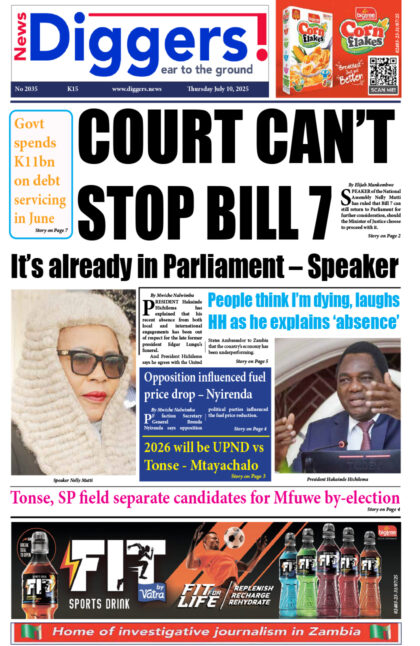Sometime this year, an investment group based in Europe organised a one-hour conference call, connecting me to 80 other global investors. The questions were about Zambia in relation to the economy, the IMF, the external and domestic debts and the fiscal regime governing the mining sector. The topic on mining (for which I was upfront I had limited expertise) consumed over 40 minutes and I concluded there were thousands of individual investors all over the world (Zambians excluded) who had built financial fortunes by owning shares in copper mining companies operating in Zambia.
These fund managers had hindsight about what the Zambian government was planning to do: a change in the mining sector regulatory environment. In summary, I told them mining companies had lost the opportunity to pre-empt any such measures by failing to proactively and predictably support government revenues. Public sentiment in favour of increased taxes for the mines was growing; civil society organisations and opposition political parties were part of this sentiment.
One investor calling from Canada lamented, ‘Does government realise that it will be shooting the goose that lays the golden egg? Mining is a long term investment- it takes no less than 10 years to get your money back- and those who put the money want a commitment the fiscal regime will not change after the investment has been done.’
GOVERNMENT RAN OUT OF PATIENCE
The recently announced tax policies affecting the mining industry signal Government’s loss of patience on lack of transparency by mining companies. The figures sitting with government show that even the mineral royalty taxes get paid back through deductions on income (MRTs get deducted before profits are declared). Auditing the mining sector is in itself a very intricate exercise due to what others term, ‘creative accounting’. From what is imported to what is exported, there is little transparency and government always finds itself chasing the wind; refunding more than it is collecting while at the same time, losing out on what should be taxed because some of the companies under-value exports. Given these factors, government is well justified to introduce a broader range of taxes.
MINING COMPANIES MAY HAVE A POINT
The mining companies, through the Chamber of Mines, have quickly come out to warn the new measures will collapse the economy. Perhaps they have a point. One of the big mining companies, currently detached from its original parent company, owes suppliers and other creditors between US $800-US $900 million. It has been surviving on importing copper ore from a neighbouring country and the new tax regime will most likely ground this company to a halt; and this liability would most likely be the responsibility of government.
Another company that has been sinking shafts to be the top single copper mining company in the world is most likely going to be in red. Mining is about growth of output and we know that nearly all smelters are operating below capacity because of low production. Some of the mining companies, such as First Quantum Minerals, currently producing nearly 50 percent of copper, may feel let down by what those fund managers called, ‘an unstable fiscal regime for the mining sector’.
WHAT WILL BE THE LIKELY IMPACT?
Reading from that statement by the Chamber of Mines, most mines will retreat into a ‘survival mode’: halting expansion projects, restructuring staff (with potential political implications), reducing production, resulting into ‘reduced revenues’ to government. It means the projected revenue in the 2019 budget may not actually be realised. This is what the mining companies meant in their statement. They foresee reduced declarations to government in terms of mineral royalty taxes (due to reduced production levels), and by doing so, they believe it will hurt government where it matters.
My projection is that as the actual impact of the new tax regime becomes real by April, 2019, Government and mining companies will come together to the table. However, all this depends on how well prepared authorities are to counter the manoeuvres (some of them genuine) by mining companies to ‘arm-twist government’ into submission. It also means the Zambia Revenue Authority will need to be capacitated in many ways to engage productively with mining companies, whose position is clear: they will pay less!
RECOMMENDED ROADMAP
Government will need to consider the bigger picture governing the mining industry. The suspended development agreements have not been replaced. Development agreements are crucial in attracting quality investments in the mining sector. The development agreements will be two sided: on one hand agreeing on a fiscal regime that guarantees returns for investors in the long term and on the other hand, a commitment by mining companies to support government programmes through transparent and sustained payment of various taxes and other. The late President Michael Sata once put together a team of technocrats headed by the late Pious Maambo to review the entire mining industry and am sure their report offers a perfect roadmap.
The budget is currently under discussion in parliament. There is sufficient time to fully interrogate the new tax regime so that come January, all potential booby-traps would have been removed. What would be disastrous is to end up with reduced tax revenues from the mining sector.



















